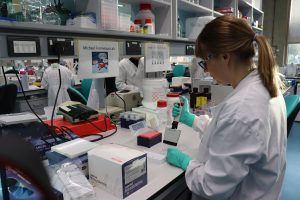AI: Computing solutions for prostate cancer
Project Summary
About the Researchers
Professor Daniel Brewer
Principal Investigator
Daniel moved to the University of East Anglia to lead the bioinformatics team within the Cancer Genetics group in 2013. His main research interests include developing and applying novel analytic techniques to large-scale ‘omic datasets from human tumour samples to answer clinically relevant questions in cancer research.
Dr Dan Woodcock
Principal Investigator
Dan is a CRUK Oxford Centre Institutional Fellow in Translational Data Science in the Big Data Institute and the Nuffield Department of Surgical Sciences. He brings his statistical and machine learning expertise to this project and is overseeing the further development of the machine learning tool, ADAMS.
Dr David Wedge
Principal Investigator
David is a Principal investigator at the University of Manchester focusing on cancer evolution and heterogeneity. David will apply previously developed computational techniques and contribute to developing new methods to identify prostate cancer subtypes that are more likely to become aggressive and spread.
Dr Valeriia Haberland
Senior Research Associate in Bioinformatics
Valeriia is a Senior Research Associate at the University of East Anglia focusing on identifying the sub-types of prostate cancer using unsupervised machine learning algorithms.
Dr Emre Esenturk
Postdoctoral Researcher
Tigers and Pussycats
Prostate cancer is the name used for all cancers that start in the prostate. However, prostate cancer tumours can be very different from each other. Some cancers are pussycats- they grow very slowly and remain confined to the prostate for decades, causing little if any effect on the individual. Others are tigers- they grow rapidly, are aggressive, and lead to advanced disease. At the moment, for many tumours, it is very difficult to know the best way to treat an individual’s prostate cancer as we do not have a reliable way of sorting the tigers from the pussycats.

Prostate cancer aggressiveness varies between individuals so determining subtypes would help treatment

Developing a classification system to sort and identify disease subtypes that behave differently has already radicalised the treatment of other diseases, like breast cancer. Different cancers have unique features which may make them particularly suitable for a certain type of treatment. For example, breast cancers containing a mutation in the HER2 gene respond very well to the drug Herceptin. In terms of prostate cancers, tumours with a mutation in a BRCA gene have been shown to respond well to PARP inhibitor treatment.
Prostate Cancer Research funded researchers Dr Daniel Brewer and Dr David Wedge talk about their work developing a new way to classify prostate cancer.
The researchers will develop a new way to classify prostate cancer and separate the tigers from the pussycats.
This will mean that patients can receive personalised treatments based on the characteristics and behaviour of their individual cancer.
Identifying cancers that grow quickly or are unlikely to grow at all can also help to decide if treatment is even needed in the first place.
Avoiding unnecessary treatment in slow growing disease means fewer patients will experience life changing side effects.
The Research Project
The researchers will use machine learning techniques to analyse a huge amount of molecular data collected from prostate cancer samples supplied by the PanProstate Cancer Group. First, the samples will be categorised into known prostate cancer subtypes then novel subtypes will be established. The researchers will then identify the features or characteristics that are related to the spread of prostate cancer and advanced disease. These features will also be investigated in more detail to see if they affect the patient’s response to treatment.

““One of the big problems in prostate cancer is that despite being highly variable there are no well-defined disease subtypes that are used in clinical practice. In breast cancer, the discovery of subgroups has underpinned better treatment strategies and patient outcomes, and we want to do the same in prostate cancer. We are really excited to be given the opportunity by PCR to perform this amazing research and hope that a result there will be a radical improvement in the way prostate cancer patients are treated.”
Dr Daniel Brewer
University of East Anglia








